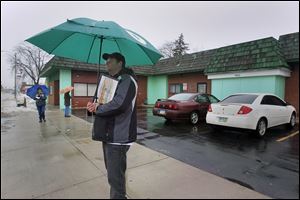
EDITORIAL
Danger and desperation
Toledo-area women seeking an abortion will become even more at risk if the city’s final abortion clinic closes
3/25/2014
People offer religious literature and general information to women at the Capital Care Clinic on West Sylvania Avenue, Toledo’s only abortion clinic.
Gov. John Kasich and the Ohio General Assembly have turned state government into an instrument for assaulting women’s reproductive rights. A shrewd but insidious strategy to enact a series of restrictions on the availability of safe and medically supervised abortions — without challenging their constitutionality — has worked here and around the country.
As a result, Ohio women — especially poor women — are pushed to sometimes desperate and dangerous measures. Those favoring abortion rights must push back to protect the rights and health of Ohio’s women.
As a Sunday story by staff writer Marlene Harris-Taylor of The Blade showed, hundreds of women in Ohio — 30 to 50 a month — now visit Detroit-area abortion clinics run by Northland Family Planning Centers.
Local women started traveling to Michigan clinics two years ago, after Ohio banned abortions after 22 weeks. In Michigan, abortions are available up to 24 weeks.
Such trips became far more frequent after Center for Choice in Toledo closed last year because it could not get the patient transfer agreements required by state law. Ohio law, effective last year, requires such agreements for patients needing emergency treatment but prohibits abortion clinics from forming a patient-transfer agreement with a taxpayer-funded public hospital. Ohio is the first state to pass such a restrictive law.
Toledo-area women who wish to have an abortion will become even more desperate if the city’s final abortion clinic, Capital Care Network, closes. The Ohio Department of Health could revoke its license because the University of Toledo Medical Center, the former Medical College of Ohio, let its transfer agreement with the clinic expire in July.
To maintain medically safe abortions in the Toledo area, the health department should grant an exception to keep Capital Care open. An administrative hearing on the issue is scheduled for today in Columbus.
The recent closing of Center for Choice in Toledo, along with two clinics in Cleveland and Akron, has left Ohio with 11 abortion clinics.
Traveling to Michigan is difficult, if not impossible, for poor women without vehicles. Ending abortion availability in Toledo also will push more women to seek unsafe and illegal alternatives, such as securing abortion drugs over the Internet. Using such drugs without medical supervision can risk a woman’s health or even life.
That’s unacceptable. People must continue to speak up against the Draconian measures passed or proposed by the Ohio General Assembly.
Abortion rights should become a significant issue in the next election. Republicans who preach limited government while advocating, in effect, government control of a woman’s body might have little to worry about in politically safe districts. Politicians in swing districts, however, do need to be concerned, as does Mr. Kasich in a statewide campaign.
It’s in the governor’s interest to rein in his party’s ideological fringe. He cannot afford to have his fingerprints on some of the most repressive anti-choice efforts in the country. Nor should a leader who spoke so eloquently, in defending Medicaid expansion, about empathizing with the poor violate the rights of women, especially poor women.